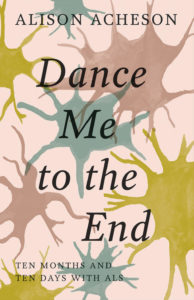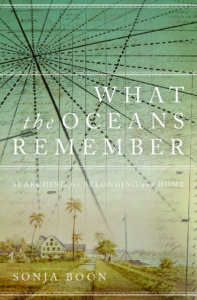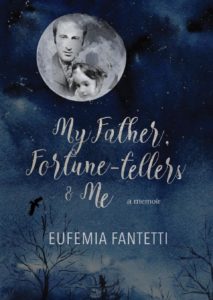December 11, 2019
Other Dives into Other Lives
Dance Me To the End, by Alison Acheson
Alison Acheson’s memoir is all about narrative, narratives the defy the laws of narrative, or at least the commonly supposed one. After twenty-five years of marriage (and raising three sons), she discovers that she’s fallen in love with her spouse again, that they have reached that pivotal moment so many couples arrive at after years of living separately and taking the other granted—and then they decide to go on into the future together. But then the future would not stretch long, because not long afterwards, her husband is diagnosed with ALS. The decline is fast and brutal—he lives just ten months after that, and she has resolved that she will care for him at home until the end, but she didn’t really know what she is promising at the time. Told in fragments, some poems, Dance Me to the End is a memoir about marriage, aging, family illness, caregiving, and how to understand one’s own story, especially when it seems like you know the ending already (but, of course, you never do).
What the Oceans Remember, by Sonja Boon
So, before I read Sonja Boon’s memoir, I didn’t actually know where Suriname was. Beside Guyana, okay, but then I thought Guyana was somewhere in Africa, perhaps, but no. Geography is difficult—for some of us more than others, it seems—which is an underlying point to this book, with Boon attempting to understand her own personal geography and history, to connect the islands of her ancestry and experience. The memoir beginning in Newfoundland, where Boon now makes her home and raises her family, but she’d been born in the UK to parents who were Dutch and Surinamese, growing up with brown skin on the Canadian prairies, the product of Dutch colonialism, the Slave trade, with ancestors who’d come from India and Africa as indentured labourers and slave workers themselves. This memoir is an exploration of memory, archival documents, and the limits of both. It’s also about music, race, lineage, inheritance, and family, and I loved it. A truly extraordinary, entrancing work.
My Father, Fortune-Tellers & Me, by Eufemia Fantetti
A memoir that begins, “My father likes to say he was lucky that God held both his hands and stopped him from killing my mother.” Who wouldn’t be intrigued and want to read on? Fantetti is a fantastic writer (I loved her short story collection A Recipe for Disaster, way back when…), and structures her memoir with the use of Tarot cards to tell a story of her Italian parents’ arranged marriage, her mother’s mental illness, which contributes to Fantetti’s own traumatic childhood, and her complicated relationship with her beloved father, who has struggles of his own. Dark and funny, vulnerable, honest and full of love, this memoir is rich and entertaining.
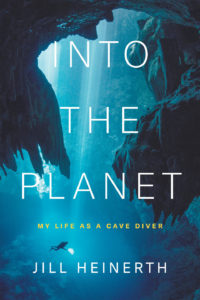
Into the Planet, by Jill Heinerth
I honestly thought I kind of knew about cave diving. Because I love swimming, see, and I loved the blue of the cover, the sense of adventure. However, nope, it turns out that cave diving is nothing like I’d ever imagined, and even reading about it made my heart race, the risks, the chances. But Heinerth writes about how it’s the risk and the chance that drives her, about using her fear instead of letting it rule her, about being a woman in a male-dominated occupation, and about the endless depths of her passion for exploration, for discovery, to find parts of the world that no one else has ever seen.
Falling for Myself, by Dorothy Ellen Palmer
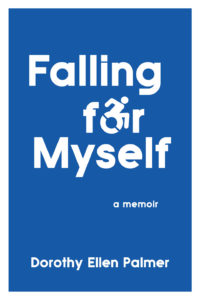
I’ve learned a lot from Dorothy Ellen Palmer over the years, about activism, and ableism, and how to write a novel with a twist. In her memoir, Falling for Myself, she puts the different pieces of identity together—adoptee, disabled, teacher, activist, parent, senior citizen, author— to tell the story of her life from A-Z, and she’s holding nothing back, fed up with being silent too long in a world that expects her (everyone) to conform to its impossible expectations. Palmer is fierce, and she is furious, justifiably so, but she is also witty, generous, a born storyteller, and she has created a fascinating and most compelling book.
December 10, 2019
Gleanings
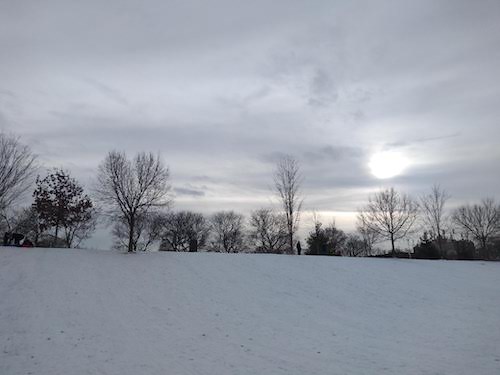
- What do you think? Shall we keep creating? Keep writing? Or is there another way you’d like to walk through the world?
- Winter has taught me to love what I am right now.
- Raving about the power and politics of translation inspired by Emily Wilson’s mind-blowingly less-misogynist translation of The Odyssey into English.
- I decide that I will not beg the trees to heal me. I believe they have enough to do.
- The only way I know to smooth out the knots of futility and despair, of doubt and uncertainty, of chaos, is to write.
December 9, 2019
Girl, Woman, Other, by Bernardine Evaristo
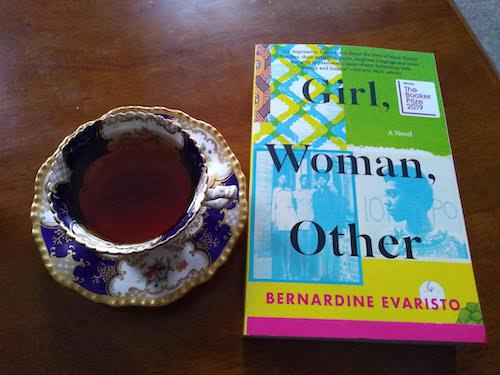
It’s so good. It’s that simple. Girl, Woman, Other is the first book by Black woman to ever win the Booker Prize (a long time coming, right?) and so you should read it, but you’ll also want to . You will start reading and not want to put this book down, and in the meantime you’ll be raving about it to strangers on the streetcar. That is, if your experience is anything like mine.
Evaristo has explained the style of the novel as “fusion fiction”: “that’s what it felt like, with the absence of full stops, the long sentences. The form is very free-flowing and it allowed me to be inside the characters’ heads and go all over the place – the past, the present.” Ostensibly about a single evening in London as a play by a Black lesbian playwright opens at the National Theatre, the novel spans the twentieth century, moves between communities in Britain, Africa and the Americas, and tells the story of twelve central characters from birth to death in a few cases, and in others to the present day. It’s a novel “about Black womanhood,” but what falls under that umbrella is wide-ranging, kaleidoscopic, diverse and disagreeing in the most fascinating way. This is a novel that’s rich with twists and connections, and surprises.
The characters include Amma, the aforementioned playwright, who recalls her radical days in contrast to now being considered establishment (or as much as a Black woman could ever be); her daughter who must find new ways to rebel against her counterculture parents; and her longtime friend and former collaborative partner, who fell in love and moved to a feminist commune in America where she becomes trapped in an abusive relationship.
The connections are not always clear at first—Carole, a superstar in the world of finance, is attending Amma’s play, but she’s part of the tapestry in other ways as well, and so is her mother, Bummi, who steers the following section, telling the story from her youth in Nigeria, her immigration to England, the death of her husband, and her determination to build a business and succeed—as well as her disappointment at how her own daughter’s success has put distance between them. And then we meet LaTisha, once upon a time Carole’s classmate, but her life took on a different kind of trajectory.
Amma’s childhood friend, Shirley, who teaches unruly youths at a London school, who started out teaching with big dreams and great ideals, which become ground into nothing after working through the Thatcherification and bureaucratization of teaching and society in general in the 1980s. And Shirley’s mother, Winsome, whose own story comes with a surprising twist, and Penelope, Shirley’s colleague, who’s got one of her own.
And then a non-binary social media influencer, Morgan, and their great-grandmother, Hattie, who lives on the family farm near Newcastle, and her own mother, Grace, which takes us to long before and far away from the opening night of Amma’s play, but everything is connected, in satisfying and illuminating ways.
That a single novel can hold so much is extraordinary —and that it can do it while being stylistically innovative and so joyful to behold is even more so. Girl, Woman, Other is magnificent, and honestly, it’s the only Booker winner you need.
December 6, 2019
The Shortest Day, by Susan Cooper and Carson Ellis
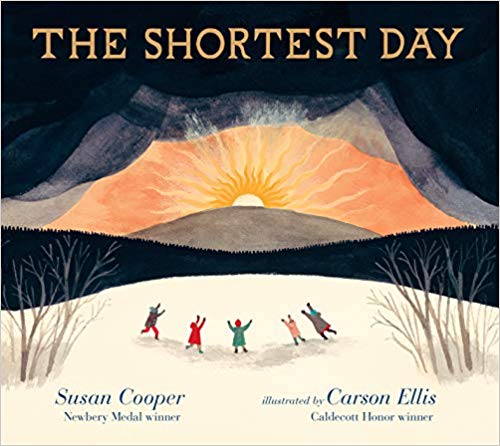
“So the shortest day came, and the year died…” begins The Shortest Day, an extraordinary picture book by Susan Cooper, with illustrations by Carson Ellis, a celebration of solstice, Yuletide, and rituals that light up the darkness. “And everywhere down the centuries/ of the snow-white world/ Came people singing, dancing,/ To drive the dark away.” In her illustrations, Ellis shows those centuries progressing in Northern European cultures, as people move from the Neolithic era, carrying spears, and then “down the centuries” to the contemporary moment, children revelling in a warm and cozy home decorated with an evergreen tree and boughs, candles and a menorah, traditions that connect us to our ancestors and to the earth. This is one of the loveliest “Christmas” books that I’ve ever come across, a book that celebrates what, to me, are the most sacred parts of the season.
December 4, 2019
Books of the Year on the Radio
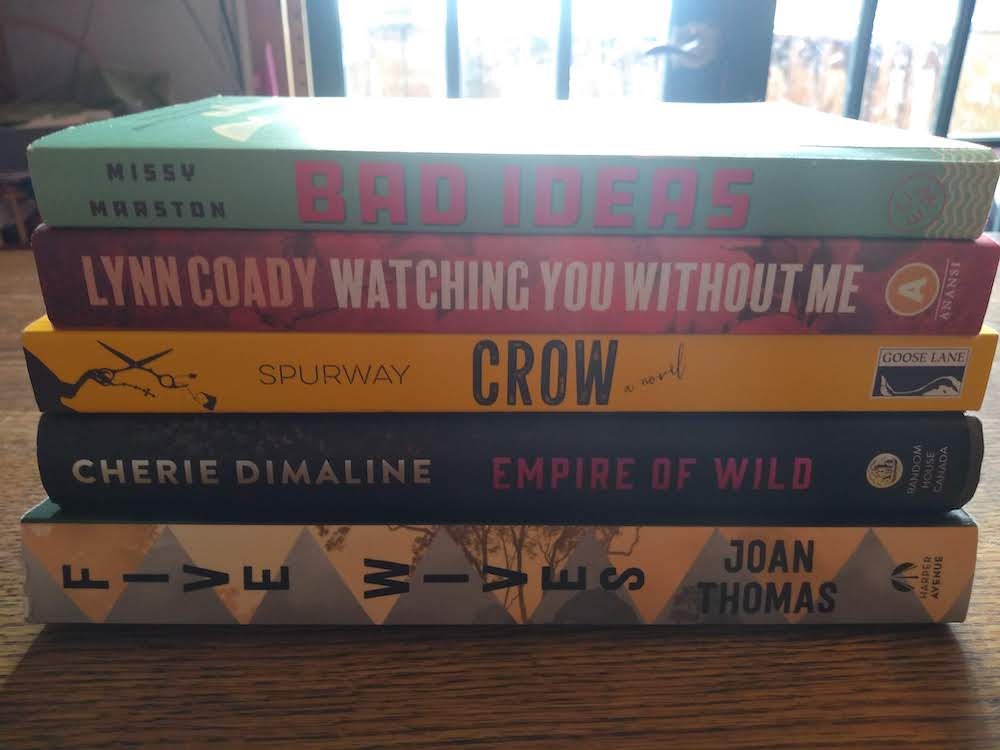
I’m putting together my 2019 Books of the Year Post now, and am so excited to share it with you—but it’s also long and I’ve got work to do, plus some reading I need to finish before the list can be as definitive as possible. (Which is not very, to be honest…) But I was very happy to select a handful of my picks for my column on CBC Ontario Morning today, a round-up of 2019 fiction that deserve so much love. You can listen here—although I am having trouble jumping ahead in the podcast and cannot tell you where I come on exactly. Hopefully any technical difficulties will be fixed soon!
December 3, 2019
Ducks, Newburyport, by Lucy Ellmann
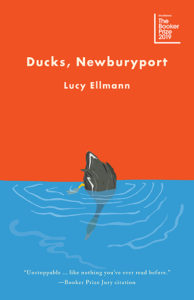
“Well, there’s a book I’m never going to read,” was my first thought upon hearing about Ducks, Newburyport, by Lucy Ellmann, the 1000 page book consisting of (mainly) a single sentence, shortlisted for the Man Booker and winner of the Goldsmiths’s Prize. Because you know how there are people who carry about tote-bags that say, “I like big books and I cannot lie?” I am not one of those people. I don’t like big books, not at all, not because of the heft necessarily (check out my own tote-bag, where I’m often carrying no less than three hardcovers at a time. I can lug book weight), but because for me so much of the pleasure of reading is thinking about what I’m going to be reading next, and the same book for weeks at a time slows me down, makes me feel like I’m standing still. Long books don’t fit easily into the pattern of my life. It’s also a huge demand to make of a reader as well, 1000 whole pages, and I’m usually irritated by anybody who’d dare to ask it.
You can keep Your Struggle, buddy. I’ve got enough of my own.
The shift began from Twitter commentary, however . (Yes, it turns out Twitter has a purpose after all.) Steven Beattie tweeted that it read up quick, and by the time Biblioasis Publisher Dan Wells had sent me an email promising that this would be a novel right up my street, I’d already started reading it.
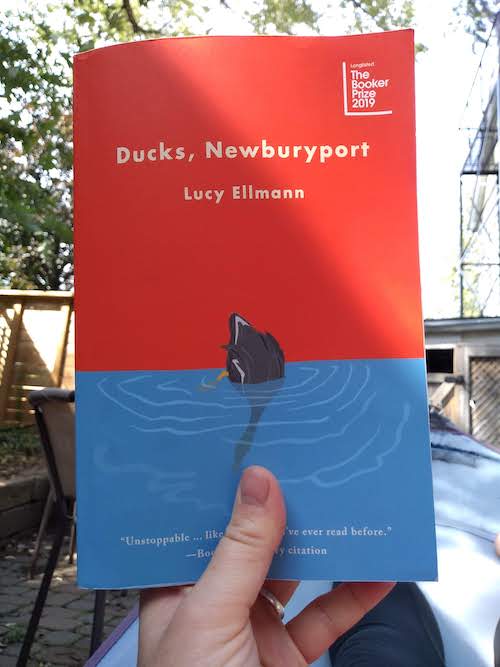
With Ducks, Newburyport, I did what I always do with huge and overwhelming challenges, which is that I broke it down into manageable pieces. Though I have heard others making a solid commitment to the novel, going in for the long haul, and they report enormous pay-offs, because it’s an amazing novel, and what a thing to give it one’s entire focus. But that’s not the reality of my reading life right now, where focus gets spread thin, and there are so many other books I have to read in the meantime, so instead of going all in for Ducks, I committed to reading 5 or 10 pages every night, and I liked that it was the kind of book that was easy to dive in and out of again. If I’m going to read 1000 pages, this is way I would like it to happen. It’s give and take.
And so it took me three months to read it, as opposed to binge-reading, and this has had a curious effect on my life. As though Ducks, Newburyport was like a plant with amorphous tendrils, and as I read, they crept their way into every facet of my life, until I was no longer sure where I ended, and Ducks, Newburyport began.
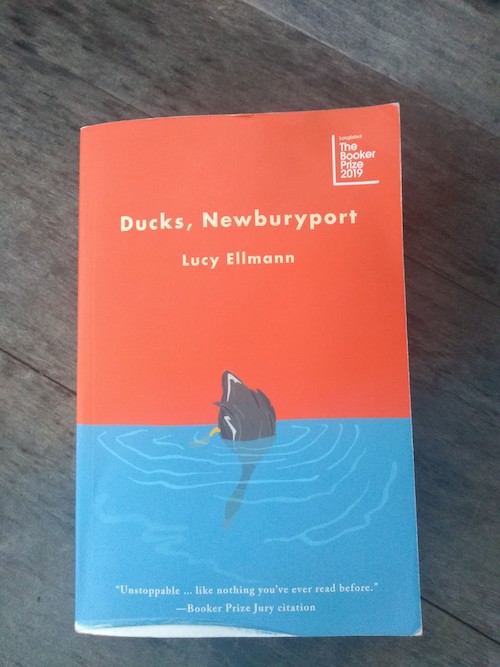
“That’s a lot like Ducks, Newburyport,” began to be the thing I said at parties, or on Twitter, no matter the topic, really, because everything is a bit like Ducks, Newburyport. Or perhaps what I mean is that Ducks, Newburyport is like life itself, which is the point of the exercise. Somebody talking about how they can never remember the word for nasturtiums, and maybe the unnamed narrator of Ducks, Newburyport had been talking about hydrangeas, but such distinctions mattered as much as the distinction between fiction and life. Everything was blurry.
It’s not accurate to say that this book is a single sentence, clauses conjoined by commas and the phrase “the fact that” to form the stream of consciousness of an Ohio woman baking pies and cookies in her kitchen, because to say this would be to forget about the parts of the novel that are written from the perspective of a cougar. Or a mountain lion, “the lioness.” What kind of novel is this anyway?
It’s the kind of novel that’s concerned with ordinary things, the mundane, the domestic. Except what does it mean that among these things ordinary and domestic are mass shootings and domestic homicides, a lunatic president and the rise of ethno-nationalism? These things melding in with the other, as our unnamed narrator caramelizes apples for tartes tatin, and fails to avoid painfully stepping on her son’s plastic toys, and worries about her distant teenage daughter, and thinks about the amazing fact of her love for her husband, never mind the sorry state of her libido, especially since her recovery from cancer not so long ago, rotting window frames and the guilt she feels for her failure to be a proper parent to her four children at the time, and she’s still not over the death of her own mother, and how their whole family fell apart during the years her mother was ill, and now her husband works so hard, is often travelling, and she adds to their income with her home baking business, because they’re broke after all her healthcare bills, supplying local shops and restaurants, her labour too blurs boundaries, both paid and domestic. And undervalued all of it.
Oh oh my gosh, the popular culture, classic films, and Meryl Streep and Dustin Hoffman (and how he was mean to her during Kramer Vs Kramer, when she’s a better actor than she’ll ever be), and the passages about Julie & Julia (“only we hate the Julie bits…”) and so much ruminating about Little House on the Prairie (as you do…), and bridge building (her husband, Leo, is an engineer), and musical theatre, and Harrison Ford and Witness, and the bee at Bread Loaf. Always, the bee at Bread Loaf, and we never actually learn anything about the fact of the bee at Bread Loaf, but other parts of the story we begin to be able to put together, puzzling out, like who is Abby, and her first marriage to Frank, and what happened to her mother, and the fact of the ducks at all. And Newburyport.
And oh, the angst of baking, her worries about sending these goods out into the world never sure that they’ve turned out successfully, because the proof is in the eating, and you can’t control it all. She’s got a freezer packed with failed experiments in lemon drizzle cake, not bad enough to be abject disasters, but not good enough to sell, and she feels guilty subjecting her children to it. Children are never enthusiastic about lemon drizzle cake anyway, the lack of frosting. Who’s actually enthusiastic about lemon drizzle cake anyway? Lemon drizzle cake existential angst, I mean. I’ve never felt so seen before. The kind of stuff that keeps me up at night.
There’s a chicken coop, and pets, and time passes, weeks and months, and in the breaks, the lioness wanders with her cubs, on overpasses and through thickets, across backyards and down into ravines, and she would like to keep her distance from humans, but she cant help it, and she becomes separated from the cubs, who are taken away in a truck to the Columbus Zoo.
Ohio is a funny place, not so different from the stories about the Florida men, really. Insane abortion laws and women kept captive in basements, and fact and fiction blurs too as our narrator recounts the stories she’s heard, news headlines. Some of them true, but it starts to feel like all of them are factual, because everything else in the novel is so familiar after all, that it becomes uncanny how much of it is not uncanny, when possibly it should be. What does it say about the world we live in (and all of us, in general) if it isn’t?
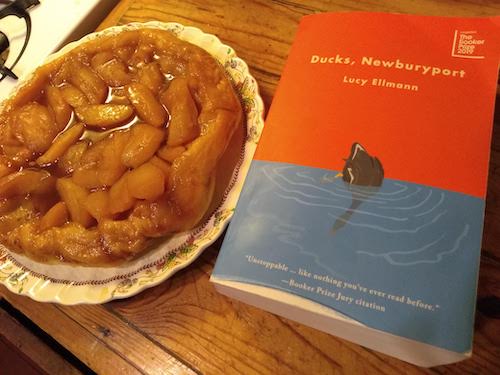
Against this backdrop of her stream-of-consciousness, a lot actually happens, although you could almost miss it, because the tone of the narrative never changes whether she’s concerned about puff pastry or is actually imperilled. She gets stranded in a snowstorm while out delivering pies, and takes her family to a mall whose parking lots entrance is washed away in a flash flood (which is the kind of thing that happens now, in Ohio and elsewhere), and then her daughter goes missing, seemingly every mother’s worst nightmare, save for another one which she comes face-to-face with by the novel’s end. But no spoilers…
Is there such thing as a pre-apocalyptic novel, was a thing I wondered as I read this book, an ordinary story with such ominousness at its margins, and creeping ever-closer, which is pretty close to how it feels sometimes to live in the world right now.
It was a commitment, this book, even if the smaller pieces I broke it into, and the other night as I finished it, I could not quite fathom what it would be like to not have this book sitting on my bedside. Three months is a long time, a quarter of a year, and as I read this novel, weeks went by, the season changed, we celebrated holidays and birthdays, had a federal election, I baked tens of dozens of muffins, and now the book itself feels indelibly connected with all of it.
This novel’s outsizedness, its audacity, is a statement on the curious proportions of life itself. What gets to be an epic? The fact that (as she’d put it) I might have spent more time ruminating on a disappointing drizzle cake than yesterday’s mass shooting; climate change and (not or) a teenage daughter’s petulance; saving the world and raising one’s children; a single person against the enormity of the human population—it’s all enough to make you go cross-eyed, to be honest. How do you understand it all, attempt to contain it all?
With this novel, however, Ellmann gets come close. A book that seems like a feat of endurance, at first, but turns out to be so much more than that.
December 2, 2019
Gleanings
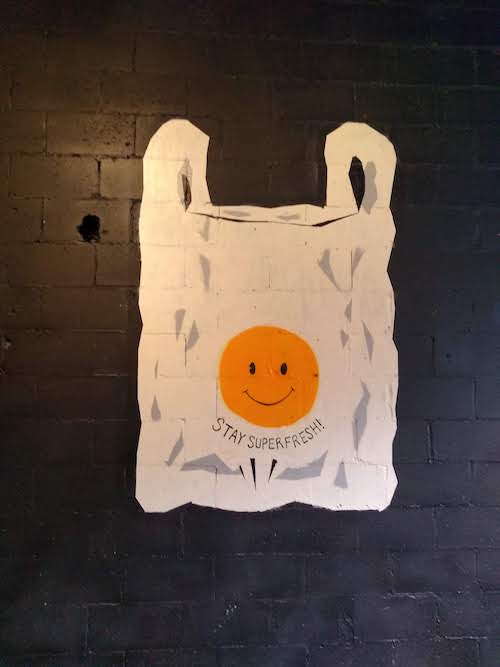
- No one gets anywhere by scrolling, they get there by doing.
- Lake Superior just happens to be Linnea’s blank page.
- Community doesn’t just happen—we have to make it happen
- When women are killed because they are women, we have to acknowledge that, and not retreat in silence. Silence doesn’t honour the dead, and it doesn’t protect the living.
- Ten years into motherhood, and my children hang off my boughs much less than they used to.
- It has taken me no less than ten years to make the acquaintance of Olive Kitteridge.
- How ordinary we all really are. How meaningful it is, to be just that: ordinary.
- A book, especially one received as a present, is a thought made tangible–a gift from the past, a gift for the future, a way to touch those who have gone before and, if we’re lucky, those to come.
- This year marks the fifth anniversary of the Short Story Advent Calendar, one of the Christmas season’s most dependably enjoyable traditions.
Do you like reading good things online and want to make sure you don’t miss a “Gleanings” post? Then sign up to receive “Gleanings” delivered to your inbox each week(ish). And if you’ve read something excellent that you think we ought to check out, share the link in a comment below.
November 28, 2019
Five Wives, by Joan Thomas
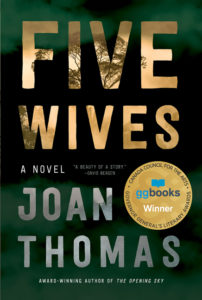
There’s a possibility I might have let the year pass me by without picking up Joan Thomas’s latest, Five Wives, winner of the 2019 Governor General’s Award for Fiction. And what a disaster that would have been, my reading year without one of the best books of the year included. But disaster was averted because I finally picked up the novel last week, and it was one of those experiences like I mentioned while I was writing about The Dutch House. As in, I was instantly enveloped and not remotley moved to clean my bathroom . (Full disclosure: this novel was actually one of those books I read in the bath until the water got so cold…)
Based on the true story of a group of American evangelical missionaries murdered in the Ecuador jungle in 1956 after making contact with an isolated Indigenous group, Thomas blurs fact and fiction fascinatingly in Five Wives—as she did with her earlier novel, Curiosity, which imaged the life of nineteenth century fossil hunter Mary Anne Anning. Billed as “in the tradition of The Poisonwood Bible,” I actually found the novel more in conversation with Miriam Toews’ Women Talking (with shades of Irma Voth!) in its consideration of the role of women in religious communities, in religion in general, and also with the fraught question of female solidarity. Because as with the women of Women Talking, and women anywhere, actually, and with people in general, the women of Five Wives do not speak with a single voice and view their shared story through very different lenses.
Although when the novel begins, theirs is a collective voice, “the wives,” in the immediate aftermath of the deaths of their husbands. The narrator does not distinguish these women, who themselves are “putting the story together”of what had befallen the men. A story that would become legend in evangelical circles, a story Thomas herself grew up hearing told, as she explains in her interview at 49thShelf. But in her novel, she complicates this mythology and explores the way in which story and narrative is constructed from the raw material of facts.
The novel’s present day story line concerns a young woman called Abby, whose mother and father had each lost their own fathers in the massacre, and had grown up steeped in the story, as her father, David, a pastor, also had. This part of the novel begins at the funeral of Abby’s maternal grandmother, Elizabeth Elliot (a real life figure whose own writings have been instrumental in spreading the story of what happened in the Ecuadorian jungle, and how the Waorani people eventually did convert to Christianity, thereby ensuring that this story of martyrdom ended in triumph and glory). And now Abby has lost her faith, much to the chagrin of her father, and we see the tension between them as she tries to find her own way, which challenges David’s own faith, in many things, including the truth of what he knows about what happened to his father and the story his family continues to tell about it to the world.
More central to the plot are the stories of the wives themselves, however, and their own struggles and challenges, those things they are sure of and that which they doubt. Abby’s grandmother, Betty, for whom missionary work was a vocation, and then Olive, who has followed her husband to Ecuador (and we meet her in the years before her marriage, when she’s attending university and developing independence from her religious family), and Marj, David’s mother, who ran the guesthouse where so many of the missionaries stayed, and her relationship with her sister-in-law, Rachel, the one woman in the group who is nobody’s wife. (“Goodness is more complicated that Marj ever imagined.”
And then Cornell Capa, the photographer from Life Magazine, who took the photographs that showed what happened in the jungle to the world—also a real-life character to whom Thomas grants a fictional inner life. And in the contemporary timeline, a film is being made about the massacre, and so there are lots of opportunities for Thomas to play with and complicate the idea of truth and myth and how stories get told.
The novel is a puzzle, pieces fitting together in surprising ways. The women’s own stories are not told chronologically, and overlap in some aspects and there are gaps in others, and not all the women are as central to the story. There is cultural appeal in this novel about mid-20th century womanhood and wifehood, which Thomas complicates interestingly, in addition to the layer of faith, religion and colonialism which complicates everything even more.
November 26, 2019
Slow News

It was the Amber Alerts that started it.
But no, lets back up. I’ve been on Twitter for almost a decade, and once upon a time it was a platform that served me well—I made friends, was referred to wonderful things to read, participated in in-jokes, pondered pop-culture trivia, was able to tell people I admired just how much I liked their work. Twitter was a bubble, but the best kind. When Rob Ford was elected Mayor of Toronto in 2010, the breaking news was a devastating collective experience. Not a peep in the Twitterverse (or mine, at least) had indicated that such a thing was possible. We were talking about echo chambers. I would consider how disappointing it was that Twitter wasn’t the world.
But then came Gamergate, which changed everything, although I didn’t know it at the time. And suddenly Twitter was the place I went to argue with Pro-lifers and have men with terrible beards call me a cunt. And then eventually even those people ceased to be actual people with names and faces (and beards) and became cartoon avatars with strings of numbers after their names and the Trudeau Must Go hashtag in their bio. And now the fact that Twitter is not the world seems like an actual blessing—which is not to say that Twitter has not changed the world somewhat in its despicable likeness. But still, that the world is not Twitter is an idea I now cling to for hope.
I am so glad that I’ve gone Back to the Blog this year, for more thoughtful and meaningful connection and engagement. Because I think that Twitter and I might be totally done. We’re long past the point where I am compulsively refreshing my screen and scrolling in a vain attempt to have the world come together in some kind of narrative sense, to find the answer. (Olivia Laing’s piece on her Twitter addiction really resonated with my own experience.) I took Twitter off my phone years ago, because it really didn’t need to be my constant companion.
There is no suggestion of an answer at all anymore, no complexity. Instead, there are people who are angry about being woken up in the night by Amber Alerts, and people who are angry about people who are angry about being woken up in the night by Amber Alerts. And here I am with my phone alerts on mute, and I just have no fucks to give about any of it.
Once upon a time, I liked Twitter, because even amidst the men who called me a cunt or the Christians who called me a baby murderer, I appreciated learning about other people’s points of view (not those people, obviously) and it was really how I got my news. But I’ve since found another way.
‘But not reading the paper only kept me from not knowing things; it didn’t keep them from happening.’
‘Maybe instant information isn’t good for us. We can’t absorb it.’
—Madeleine L’Engle, A Ring of Endless Light
I still get a newspaper on the weekends, as I have for years, but in the last year, I started buying and then ordered a subscription for The Guardian Weekly. And because it’s a magazine instead of a newspaper (which always feels stale after a day), it hangs around all week, and everybody in our house reads it. There are book reviews, and culture pieces, and news from all over the world, and long-form pieces, and summaries of breaking events. It’s great, but even better? It always arrives in the mail about a week after the fact. Sometimes even longer. So that much of the “breaking news” by then has been put back together and healed over again.
And I love it.
There is context. There are facts. Instead of compulsively refreshing for it all to make sense, I have waited—and then sometimes it even does make sense by then. The news is also finite, which is splendid, and there aren’t Nazis (except in stories on the rise of white nationalism).
What would happen if you had an unpopular opinion and kept it to yourself? What would happen if your consciousness wasn’t displayed upon a ticker-tape for everyone to see? What would happen if people stopped beginning sentences with, “Am I the only one who…” or sharing unpopular opinions about food, or even having opinions at all about food.
What if you just ate your lunch?*
*After photographing it and posting it on Instagram, of course, because not all social media platforms are dead to me yet.
November 25, 2019
Local, Sustainable and World-bettering: Great Holiday Gifts
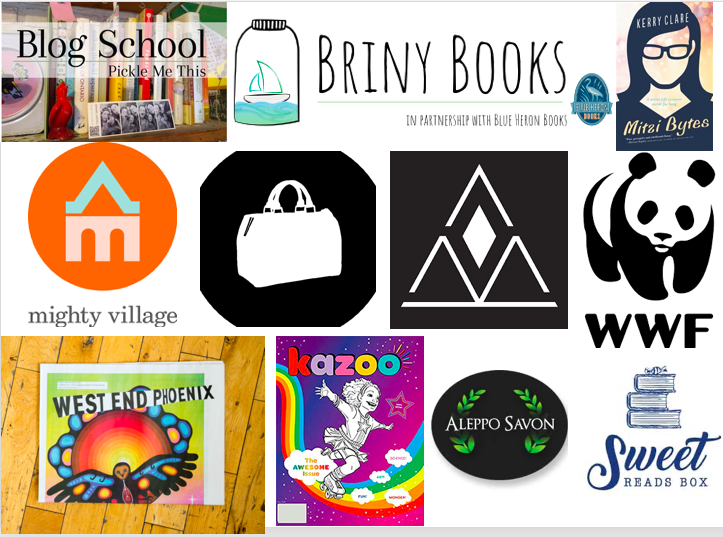
My newsletter went out this morning with a special holiday gift list, including goods and services I’ve got on offer (a special holiday deal for Blog School!), and a whole bunch more that are things I love and which might prove inspirational as you make your own lists and check them twice. Local, sustainable and world-bettering were my priorities. Check it out!
PS It’s not too late to get a 2019 Short Story Advent Calendar!
